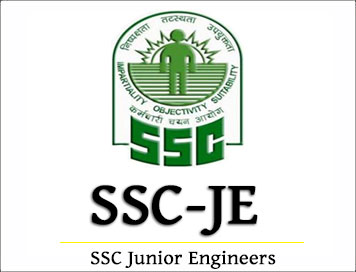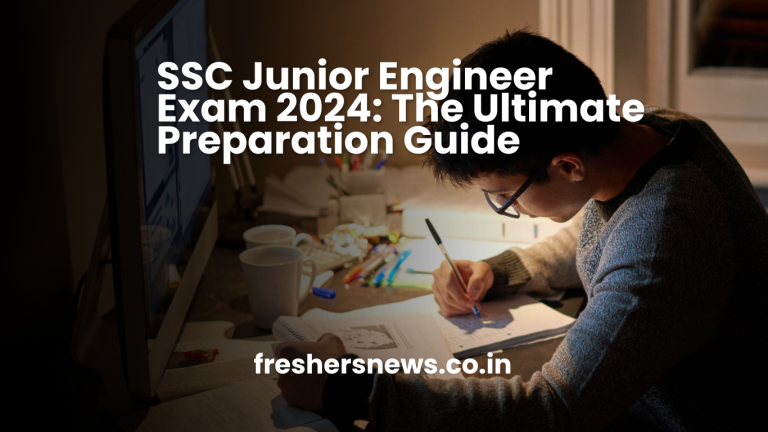What is the SSC Junior Engineer Exam?
The SSC Junior Engineer Exam is a competitive exam performed through the Staff Selection Commission (SSC) to recruit candidates for the post of junior engineer in a variety of departments and businesses of the Central Government. The examination is held each and every year and is one of the most famous authorities assessments in India. Here we are talking about the SSC Junior Engineer Exam 2023: The Ultimate Preparation Guide.
Here we are discussing SSC Junior Engineer Exam 2023: The Ultimate Preparation Guide:

Why should you take the SSC Junior Engineer Exam?
- There are many reasons why you must take the SSC Junior Engineer Exam. Here are a few:
It is a great chance to get an official job. SSC JE jobs provide the right salaries, job security, and different benefits. - The examination is competitive; however, it is additionally achievable with difficult work and dedication.
- There are many sources accessible to assist you in putting together the exam.
- SSC JE jobs provide a variety of professional opportunities. You can work in a range of departments and organizations, and you can additionally pass up the ranks to greater senior positions.
Eligibility standards for the SSC Junior Engineer Exam
To be eligible for the SSC Junior Engineer Exam, you need to meet the following criteria:
You have to be an Indian citizen.
- You ought to have a bachelor’s degree in engineering from an identified college or institute.
- You ought to be between the ages of 18 and 30 as of January 1st of the 12 months of the exam.
- You need to meet the physical fitness requirements prescribed by the SSC.
Exam pattern for the SSC Junior Engineer Exam
The SSC Junior Engineer Exam is a computer-based check consisting of two papers:
- Paper 1: General Intelligence, Reasoning, and General Awareness
- Paper 2: Technical Subjects (Civil, Mechanical, or Electrical Engineering)
Each paper has 200 marks and is two hours in duration. The total marks for the examination are 400.
The syllabus
The syllabus for the SSC Junior Engineer Exam consists of three parts:
General intelligence and reasoning: This section checks the candidate’s ability to think seriously and clear up problems. Questions in this section might also cover subjects such as:
- Verbal reasoning
- Non-verbal reasoning
- Logical reasoning
- Quantitative reasoning
General Awareness: This section checks the candidate’s general understanding of the world around them. Questions in this part may additionally cover subjects such as:
- Current affairs
- History
- Geography
- Economics
- Science and technology
Technical Subjects (Electrical, Mechanical, Civil, and Structural): This section assesses the candidate’s expertise in the technical topics applicable to their chosen engineering discipline. Questions in this section may additionally cover matters such as:
- Electrical engineering: basic electrical concepts, circuit theory, electrical machines, power systems, etc.
- Mechanical engineering: engineering mechanics, thermodynamics, fluid mechanics, machine design, etc.
- Civil engineering: structural engineering, building materials, surveying, transportation engineering, etc.
The unique topics included in the Technical Subjects part will vary depending on the candidate’s chosen engineering discipline. However, the general focus of this area is to check the candidate’s knowledge of the simple concepts and principles of their chosen field. Candidates are recommended to consult the latest syllabus launched by the SSC for an extra-unique overview of the matters included in every exam section.
Here are some tips for getting ready for the syllabus
- Ensure you understand your chosen engineering discipline’s primary standards and ideas.
- Practice solving issues on a range of topics.
- Keep up with present-day events and developments in your field.
- Read extensively and continue to be informed about the world around you.
- By following these tips, you can increase your chances of success on the SSC Junior Engineer Exam.
Books available for the SSC Junior Engineer Exam
Some of the most popular and distinctly recommended books include:
- SSC Junior Engineer Exam Preparation Book 2024, with the aid of Arihant Experts This book covers all of the matters on the SSC Junior Engineer Exam syllabus in a complete and easy-to-understand manner. It also consists of exercise questions and mock exams to help you verify your preparation level.
- SSC Junior Engineer Exam: Complete Study Material 2024 by way of Pearson. This book is another great, useful resource for preparing for the SSC Junior Engineer Exam. It covers all of the syllabus matters in detail and additionally consists of practice questions and mock tests.
- SSC Junior Engineer Exam Practice Sets 2024 by Made Easy This book is best for candidates who are looking for a good series of exercise questions and mock tests. It covers all of the syllabus matters and consists of a range of question types.
In addition to these books, you might also prefer to consider using different resources, such as online courses, practice websites, and previous year’s question papers.
Here are some guidelines for deciding on the right books for your preparation:
Consider your budget. Books can be expensive, so choosing books that fit your budget is essential.
- Read reviews of special books before you purchase them. This will help you understand which books are well-written and informative.
- Make certain that the books you pick out cover all of the matters on the SSC Junior Engineer Exam syllabus.
After Aualifying for the SSC Junior Engineer Exam
You will want to go through the following three aspects:
Document verification: The SSC will verify your unique files to ensure your job eligibility. The files that you will want to carry for document verification include:
- Your SSC Junior Engineer Exam admit card
- Your SSC Junior Engineer Exam scorecard
- Your educational certificates (e.g., 10th class certificate, 12th class certificate, engineering degree certificate)
- Your caste certificates (if applicable)
- Your disability certificates (if applicable)
- Your passport measurement photographs
Medical examination: You will additionally want to undergo a medical examination to make sure that you are physically fit for the job. A doctor authorized by the SSC will perform the scientific examination.
Appointment: Once you have cleared the record verification and clinical examination, you will be appointed junior engineer. You will get an appointment letter from the SSC with your appointment details.
Here are some suggestions for aspects after qualifying for the exam:
- Be prepared for the document verification process. Make sure that you have all of the required archives in order.
- Be organized for the medical examination. Get ample sleep and eat a healthy diet before the examination.
- Be organized to acquire your appointment letter. Once you have acquired it, you will want to document it at your assigned responsibility station.
Congratulations on qualifying for the SSC Junior Engineer Exam! I wish you all the best in your new career.
Tips for cracking the SSC Junior Engineer Exam
Here are some hints for cracking the SSC Junior Engineer Exam:
- Start preparing early. The SSC Junior Engineer Exam is competitive, so it is necessary to begin getting ready early. This will give you enough time to cover all the syllabus subjects and practice fixing problems.
- Create a study plan. A learn-about plan will help you remain prepared and on track.
When developing your Study plan, be sure to include the following:
A list of all the subjects that you want to cover
- A timetable of when you will find out about every topic
- A mix of active and passive learning activities
- Gather the necessary learning materials, which might include textbooks, learning guides, practice questions, and online resources.
- Focus on the important topics. Not all subjects on the SSC Junior Engineer Exam are created equal. Some subjects are more important than others, and some topics are more likely to be examined on the exam. When you are studying, focus on the most important topics first.
- Practice regularly. The best way to prepare for an examination is to practice regularly. This will help you relax about the kinds of questions that are requested on the examination and enhance your speed and accuracy.
- Take mock tests. Mock assessments are a great way to examine your preparation level and discover areas for improvement. As you approach the examination date, take mock tests often.
- Stay motivated.
Common mistakes to keep away from in the SSC Junior Engineer Exam
Here are some common mistakes to keep away from in the SSC Junior Engineer Exam:
- Not managing your time effectively. Time management is necessary in any aggressive exam but is essential in the SSC Junior Engineer Exam. You will want to be able to answer questions quickly and precisely to maximize your score.
- Not trying all of the questions. Even if you do not understand the answer to a question, it is vital to strive for it anyway. There is no negative marking in the SSC Junior Engineer Exam, so even if you guess the answer, you can get it right.
- Making careless mistakes It is essential to be careful and proofread your solutions before you put up your answer sheet. Careless errors can cost you valuable marks.
- Not practicing enough. Practice is essential for success in any aggressive exam. Make certain to exercise often and take mock tests as you get closer to the exam date.
Conclusion
The SSC Junior Engineer Exam is a competitive examination carried out by the Staff Selection Commission (SSC) to recruit candidates for the post of junior engineer in a range of departments and corporations of the Central Government. The examination consists of two papers: General Intelligence and Reasoning and General Awareness, and Technical Subjects.
To prepare for the exam, you want to create a learning plan, gather the necessary learning materials, focus on the essential topics, practice regularly, and take mock tests.
After qualifying for the exam, you will want to go through document verification, a medical examination, and an appointment.

